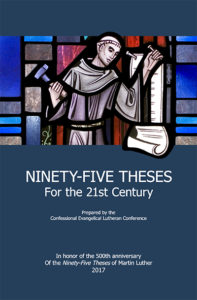
Zambian BDiv pastors visiting Chibala Nyirenda at a hospital in Lusaka.
Last week’s CELC News Brief referred to the Confessional Lutheran Institute (CLI) in Africa. Perhaps a further explanation of this endeavor will be useful to CELC brothers and sisters and others.
Some readers may recall a theological education effort for pastors headquartered in Lusaka, Zambia. It was known as the Greater Africa Theological Studies Institute, or GRATSI. From 2010 to 2019, through partnership with Wisconsin Lutheran Seminary and WELS World Missions, GRATSI offered studies on two levels, bachelor’s and master’s degree, to qualified pastors in the Lutheran Church in Central Africa (Malawi and Zambia synods). On occasion guest pastors from Cameroon and Kenya also attended.
CLI has now expanded the goals of GRATSI in several ways.
A) GRATSI had BDiv cohorts 2010–2014 and 2015–2019, via guest instructors. CLI has a resident director, your reporter. He teaches some of the classes and is adjunct to the three-man Pastoral Studies Institute team at Wisconsin Lutheran Seminary. He and the PSI team coordinate guest instructors, both in-person and occasionally online.
B) GRATSI connected pastors only from Malawi and Zambia to bachelor’s degrees from Wisconsin Lutheran Seminary. But CLI now has enrollees from 5 countries in its BDiv studies: Cameroon (1), Kenya (3), Malawi (5), Nigeria (2), and Zambia (8). Six men are also in MTh studies: Kenya (3), Malawi (1), and Zambia (2).
C) GRATSI began before the WhatsApp era. Today CLI employs WhatsApp, Africa’s most common smartphone messaging platform, for much of our internal communication.
D) GRATSI focused on formal continuing education. CLI does the same, but it also aims in two other directions:
- informal continuing education /professional development, and
- seminary consultation.
Today our scope has widened, but CLI still aims for practical, Christ-centered, gospel-predominating outcomes.
Here is an example. In April Professor Bradley Wordell of Wisconsin Lutheran Seminary asked the BDiv cohort on WhatsApp for reflections of what Psalm 34 means to them.
Pastor Du Shawa (LCCA-Z) wrote, “We sometimes foolish get ourselves into a deep mess. Here in Psalm 34 we see God always bring us back into our right sense and enable us to call His Name. It’s worth mentioning that it is not because we call Him that God comes to help. No. Our cry or prayer does not influence God’s decision. He help because ‘The LORD is close to the broken hearted and saves those who are crushed in spirit’ (v18).
“We are always broken hearted and crushed people, meaning we cannot think of calling our God for help if not empowered by God.
“Secondly problems and troubles—by this I mean real problems— will always be there as long we live in this sinful world, some caused by our foolishness and some by the devil. But the comfort is no problem is too big for God and no problem is too small for God to ignore. Because God is too close to us in every situation.
“My hope is that the troubles of this world must not discourage me to do the will of God and again despite my weakness God will always give the ministerial ability to continue doing his work.”
Submitted by Pastor Daniel Witte who lives in Lusaka, Zambia, partners with the Pastoral Studies Institute at Wisconsin Lutheran Seminary, and heads the Confessional Lutheran Institute of the WELS One Africa Team
